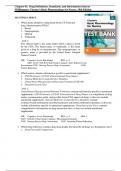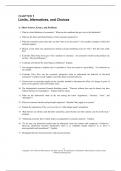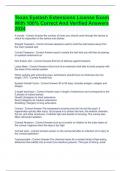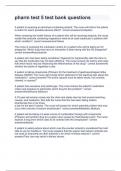Chapter 01: Drug Definitions, Standards, and Information Sources
Willihnganz: Clayton’s Basic Pharmacology for Nurses, 19th Edition
MULTIPLE CHOICE
1. Which name identifies a drug listed by the US Food and
drug Administration (FDA)?
a. Brand
b. Nonproprietary
c. Official
d. Trademark
ANS: C
The official name is the name under which a drug is listed
by the FDA. The brand name, or trademark, is the name
given to a drug by its manufacturer. The nonproprietary, or
generic, name is provided by the United States Adopted
Names Council.
DIF: Cognitive Level: Knowledge REF: p. 9
OBJ: 1NAT: NCLEX Client Needs Category: Safe, Effective Care
Environment TOP: Nursing Process Step: Assessment CON:
Patient Education
KA
2. Which source contains information specific to nutritional supplements?
a. USP Dictionary of USAN & International Drug Names
b. Natural Medicines Comprehensive Database
c. United States Pharmacopoeia/National Formulary (USP NF)
d. Drug Interaction Facts
G
ANS: C
United States Pharmacopoeia/National Formulary contains information specific to nutritional
supplements. USP Dictionary of USAN & International Drug Names is a compilation of drug
U
names, pronunciation guide, and possible future FDA approved drugs; it does not include
nutritional supplements. Natural Medicines Comprehensive Database contains
evidence-based information on herbal medicines and herbal combination products; it does not
A
include information specific to nutritional supplements. Drug Interaction Facts contains
comprehensive information on drug interaction facts; it does not include nutritional
supplements.
DIF: Cognitive Level: Knowledge REF: p. 4 OBJ: 3
NAT: NCLEX Client Needs Category: Physiological Integrity
TOP: Nursing Process Step: Assessment CON: Nutrition | Patient Education
3. Which drug reference contains drug monographs that describe all drugs in a therapeutic class?
a. Drug Facts and Comparisons
, b. Drug Interaction Facts
c. Handbook on Injectable Drugs
d. Martindale—The Complete Drug Reference
ANS: A
Drug Facts and Comparisons contains drug monographs that describe all drugs in a
therapeutic class. Monographs are formatted as tables to allow comparison of similar
products, brand names, manufacturers, cost indices, and available dosage forms
Online version is available.
DIF: Cognitive Level: Knowledge REF: p. 4 Table 1.2
OBJ: 3 NAT: NCLEX Client Needs Category: Physiological Integrity
TOP: Nursing Process Step: Assessment CON: Safety | Patient Education | Clinical Judgment
4. Which drug reference contains monographs about virtually every single-entity drug available
in the United States and describes therapeutic uses of drugs, including approved and
unapproved uses?
a. Martindale: The Complete Drug Reference
b. AHFS Drug Information
c. Drug Reference
d. Drug Facts and Comparisons
ANS: B
AHFS Drug Information contains monographs about virtually every single-entity drug
KA
available in the United States and describes therapeutic uses of drugs, including approved and
unapproved uses.
DIF: Cognitive Level: Knowledge REF: p. 4 Table 1.2
OBJ: 3 NAT: NCLEX Client Needs Category: Physiological Integrity
TOP: Nursing Process Step: Planning CON: Safety | Patient Education | Clinical Judgment
G
5. Which online drug reference makes available to healthcare providers and the public a
standard, comprehensive, up-to-date look up and downloadable resource about medicines?
U
a. American Drug Index
b. American Hospital Formulary
c. DailyMed
A
d. Drug Reference
ANS: C
DailyMed makes available to healthcare providers and the public a standard, comprehensive,
up-to-date look up and downloadable resource about medicines. The American Drug Index is
not appropriate for patient use. The American Hospital Formulary is not appropriate for
patient use. The drug reference is not appropriate for patient use.
DIF: Cognitive Level: Knowledge REF: p. 3 | p. 4 OBJ: 3
NAT: NCLEX Client Needs Category: Physiological Integrity
TOP: Nursing Process Step: Implementation
CON: Safety | Patient Education | Clinical Judgment
6. Which legislation authorizes the FDA to determine the safety of a drug before its marketing?
a. Federal Food, Drug, and Cosmetic Act (1938)
b. Durham Humphrey Amendment (1952)
, c. Controlled Substances Act (1970)
d. Kefauver Harris Drug Amendment (1962)
ANS: A
The Federal Food, Drug, and Cosmetic Act of 1938 authorized the FDA to determine the
safety of all drugs before marketing. Later amendments and acts helped tighten FDA control
and ensure drug safety. The Durham Humphrey Amendment defines the kinds of drugs that
cannot be used safely without medical supervision and restricts their sale to prescription by a
licensed practitioner. The Controlled Substances Act addresses only controlled substances and
their categorization. The Kefauver Harris Drug Amendment ensures drug efficacy and greater
drug safety. Drug manufacturers are required to prove to the FDA the effectiveness of their
products before marketing them.
DIF: Cognitive Level: Knowledge REF: p. 5 Table l.3
OBJ: 5 NAT: NCLEX Client Needs Category: Physiological Integrity
TOP: Nursing Process Step: Assessment
CON: Safety | Patient Education | Evidence | Health Care Law
7. Which classification does meperidine (Demerol) fall under?
a. I
b. II
c. III
d. IV
KA
ANS: B
Meperidine (Demerol) is a Schedule II drug; it has a high potential for abuse and may lead to
severe psychological and physical dependence. Schedule I drugs have high potential for abuse
and no recognized medical use. Schedule III drugs have some potential for abuse. Use may
lead to low to moderate physical dependence or high psychological dependence. Schedule IV
drugs have low potential for abuse. Use may lead to limited physical or psychological
G
dependence.
DIF: Cognitive Level: Knowledge REF: p. 10 OBJ: 2
U
NAT: NCLEX Client Needs Category: Safe, Effective Care Environment
TOP: Nursing Process Step: Assessment CON: Patient Education | Addiction | Pain
A
8. Which action would the FDA take to expedite drug development and approval for an outbreak
of smallpox?
a. List smallpox as a health orphan disease.
b. Omit the preclinical research phase.
c. Extend the clinical research phase.
d. Fast track the investigational drug.
ANS: D
Once the Investigational New Drug Application has been approved, the drug can receive
highest priority within the agency, which is called fast tracking. A smallpox outbreak would
become a priority concern in the world. Orphan diseases are not researched in a priority
manner. Preclinical research is not omitted. Extending any phase of the research would mean
a longer time to develop a vaccine. The FDA must ensure that all phases of the preclinical and
clinical research phase have been completed in a safe manner.
DIF: Cognitive Level: Knowledge REF: p. 7 OBJ: 5
, NAT: NCLEX Client Needs Category: Safe, Effective Care Environment
TOP: Nursing Process Step: Assessment
CON: Health Care Law | Health Care Policy | Infection | Care Coordination
9. Which statement is true about over-the-counter (OTC) drugs?
a. They are not listed in the USP NF.
b. A prescription from a healthcare provider is needed.
c. They are sold without a prescription.
d. They are known only by their brand names.
ANS: C
OTC medications do not require a prescription. A variety of names, both generic and trade,
can be used for individual drugs sold OTC. OTC drugs are listed in the USP NF. Prescription
drugs require an order by a health professional who is licensed to prescribe, such as a
physician, nurse practitioner, physician assistant, or dentist.
DIF: Cognitive Level: Comprehension REF: p. 2 OBJ: 2
NAT: NCLEX Client Needs Category: Physiological Integrity
TOP: Nursing Process Step: Planning CON: Patient Education
10. Which is the most authoritative reference for medications that are injected?
a. Martindale: The Complete
b. Handbook on Injectable Drugs
c. DailyMed
KA
d. Handbook of Nonprescription Drugs
ANS: B
The Handbook on Injectable Drugs is the most comprehensive reference available on the
topic of compatibility of injectable drugs. It is a collection of monographs for more than 300
injectable drugs that are listed alphabetically by generic name.
G
DIF: Cognitive Level: Knowledge REF: p. 4 OBJ: 3
NAT: NCLEX Client Needs Category: Physiological Integrity
U
TOP: Nursing Process Step: Assessment CON: Clinical Judgment | Safety
11. Which statement is true about Lomotil?
a. Abuse potential for this drug is low.
A
b. Psychological dependency is likely.
c. There is a high potential for abuse.
d. This drug is not a controlled substance.
ANS: A
Lomotil, a Schedule V drug, has an abuse potential of limited physical or psychological
dependence liability compared with drugs in Schedule IV. Because abuse potential is low with
a Schedule V drug, a prescription may not be required. Psychological dependency is not likely
with a Schedule V drug. Schedule V drugs are classified as controlled substances.
DIF: Cognitive Level: Knowledge REF: p. 5 Box 1.1 OBJ: 2
NAT: NCLEX Client Needs Category: Physiological Integrity
TOP: Nursing Process Step: Assessment CON: Clinical Judgment | Safety | Patient Education







